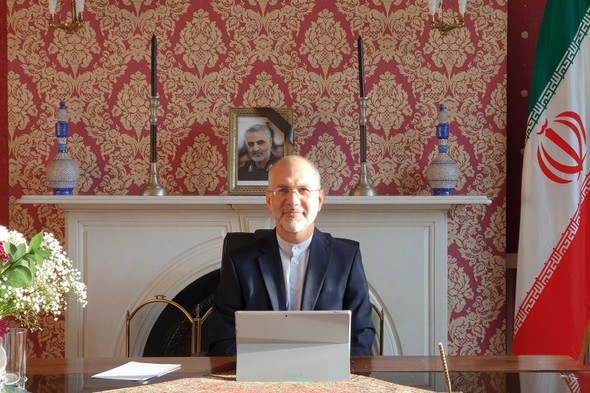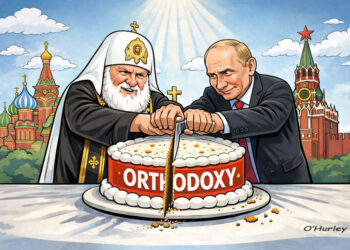by Miceál O’Hurley
Diplomatic Editor
CORK — With Honduras being the 50th country having ratified the Treaty on the Prohibition of Nuclear Weapons (TPNW) the treaty will come into effect on 22 January 2021. Ireland ratified the treaty in August of this year to mark it’s commitment to a non-nuclear world on the 75th Anniversary of the nuclear bombings of Nagasaki and Hiroshima.
Because the world’s existing, declared nuclear powers, the US, Britain, France, China and Russia have not signed the treaty (nor has North Korea), this historic achievement in the long, ardent struggle to ban nuclear weapons remains largely symbolic. Anti-nuclear weapons activists continue to hold-out hope that this step will be a milestone in creating deterrence to further horizontal proliferation of nuclear weapons on the world stage.
United Nations Secretary General, Antonio Guterres, called this benchmark “the culmination of a worldwide movement to draw attention to the catastrophic humanitarian consequences of any use of nuclear weapons”, according to a UN statement. “It represents a meaningful commitment towards the total elimination of nuclear weapons, which remains the highest disarmament priority of the United Nations.”
Irish Foreign Affairs Minister, Simon Coveney commented on the landmark achievement, “I am pleased that the 50th instrument of ratification of the Treaty on the Prohibition of Nuclear Weapons was deposited yesterday, meaning the Treaty will enter into force on 22 January 2021. At a time of rising international tensions, and as we see renewed concerns about nuclear weapons proliferation, a renewed arms race and the destabilising effects of technological developments, the support for the Treaty is a clear indication of the will of the majority of countries to add fresh momentum to achieve the goal of a world free of nuclear weapons. The significance of the Treaty lies in the fact that for the first time, the core objective of the prohibition of nuclear weapons will be clearly and unambiguously stated in an international Treaty. It challenges us to think about the enormity of the threat posed by these weapons, and by stigmatizing and prohibiting nuclear weapons, it makes a statement that these weapons are no longer acceptable. I am pleased that Ireland ratified the Treaty earlier this year, on the 75th anniversary of the bombing of Hiroshima, continuing our long history of leadership in nuclear disarmament. On this occasion, I pay particular tribute to all victims and survivors of nuclear weapons use and nuclear weapons testing. We owe a debt of gratitude to the survivors who have spent decades campaigning for the elimination of nuclear weapons.”
The International Campaign to Abolish Nuclear Weapons (ICAN), the coalition that won the 2017 Nobel Peace Prize for its key role in bringing the treaty to fruition announced, “Today is a victory for humanity, and a promise of a safer future.” Other NGOs echoed the sentiment. Speaking on news of the 50th State having ratified the treaty, President of the International Committee of the Red Cros, Peter Maurer said, “Today is a victory for humanity, and a promise of a safer future.”
In August 2020, the 75th anniversary of the nuclear attacks on Nagasaki and Hiroshima, marked a flury of nations ratifying the treaty, including Nigeria, Malaysia, Ireland, Malta and Tuvalu. Thailand, Mexico, South Africa, Bangladesh, New Zealand, Vietnam and the Vatican are among the countries having previously ratified it.
Despite the surge in ratifications for the treaty, in letter widely regarded as a condescending foreign relations misstep, the Trump administration in Washington, D.C. wrote “Although we recognize your sovereign right to ratify or accede to the Treaty on the Prohibition of Nuclear Weapons (TPNW), we believe that you have made a strategic error and should withdraw your instrument of ratification or accession.” Trump directed his administration to forward the letter to all signatory States urging them to take the unprecedented step of rescinding their ratifications. The letter, obtained by the Associated Press, said the five original nuclear powers (US, Russia, China, Britain and France) as well as US NATO allies “stand unified in our opposition to the potential repercussions” of the treaty.
Previous treaties that have sought to ban cruel weapons of war, such as landmines and cluster munitions, chemical weapons and other deadly weapons created a global stigma for those States that stockpile, conduct advancement research or use such weapons. Proponents of the treaty believe such States will become alienated from world support and therefore change their behaviour and someday renounce nuclear weapons.
Recent history would tend to militate against nuclear powers giving up their arsenals. In 1994, Ukraine adopted the Treaty on the Non-Proliferation of Nuclear Weapons (NPT) and committed itself to destroying their sizeable nuclear weapons, then the third largest nuclear arsenal in the world. In 1996, Ukraine was given promises by OSCE meeting participants (the Russian Federation, United Kingdom of Great Britain and Northern Ireland and the United States of America) that its territorial borders would be safeguarded through the Budapest Memorandum on Security Assurances. In 2009, Russia and the United States released a joint statement that the memorandum’s security assurances would still be respected after the expiration of the START Treaty. However, the UN and EU resolved that Russia violated the Budapest Memorandum assurances with their 2014 invasion and occupation of Donbas, and its temporary annexation of Crimea, and therefore imposed a series of sanctions against Russia. For this reason, analysts agree that aspiring nuclear weapons States, specifically North Korea, would outright reject giving up their nuclear arsenals for fear that it would make them as vulnerable as Ukraine and security assurances have proven meaningless.
Likewise, the five declared nuclear States would unlikely readily commit to destroy their nuclear arsenals, thus imperiling the effectiveness of this Treaty. Nuclear-armed States argue their arsenals serve as a deterrent and consequently they each remain committed to the NPT, which seeks to prevent the horizontal spread of nuclear weapons while rejecting the TPNW.
Russia and the US, who have been unable or unwilling to break an impasse despite long-running talks aimed at extending New START treaty, face a looming treaty sunset. New START, which limits both sides to 1,550 deployed warheads is due to expire in February 2021. Current US proposals include modifying New START to include China and cover many new kinds of weapons. Last week, Russia indicated its willingness to extend the agreement for five years without any new conditions. All current proposals by each State have been flatly rejected by the other.
In the meanwhile, proponents of the Treaty on the Prohibition of Nuclear Weapons (TPNW) celebrate Honduras’ ratification that will see the treaty go into effect, even with a long-view and guarded optimism.
_________
Reporting includes citations for AP News Service.















































